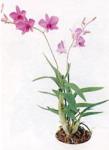|
|
DendrobiumFamily: Orchidaceae.
|
|
|
 |
Genus of about 900 species of deciduous, semi-evergreen, or evergreen, epiphytic and terrestrial orchids from India and S.E.Asia to New Guinea, Australia, and the Pacific Islands. They have elongated, stem-like pseudobulbs with linear or lance-shaped to ovate leaves. Flowers are borne in racemes, from nodes along the stems, usually from spring to summer.
The name means "living on a tree". |
|
| Growing conditions |
Watering and misting |
Propagation |
| Dendrobiums can withstand hot weather if adequate ventilation and humidity are provided. They do best when the temperature is between 65°F and 75°F in the day and between 55°F. to 60°F. at night. A minimum humidity of 50% is generally considered a necessity. However it does not need to be constant, in the home, morning misting and or gravel trays are usually enough. Air movement essential at all times, but especially critical when the humidity is very high. They need an abundance of light, but not direct sun. A lightly shaded South window is best. East or West facing windows are satisfactory if bright (avoid direct sun except at the beginning or end of the day). Dendrobiums do not like to be potted in large pots, and are often as much as ten times as tall as the pot is wide. |
Water freely. Dendrobiums should be drained well and like to be almost dry before re-watering. Misting is necessary when the humidity is low. |
Divide when plant fills and overflows the container. Plant offsets when roots are actively growing. For deliduous species, take stem cuttings of the older stems, each with one or more dormant buds, and lay them on damp moss in humid conditions. Pot up individually when rooted, usually after a few months. |
|
These materials are freely provided for instructional and educational purposes. Any duplication or publication of text or images herein for commercial gain without explicit written permission of the owner or photographer constitutes breach of trust and violation of copyright.
Copyright © Galka Okhapkina 1998-2026

